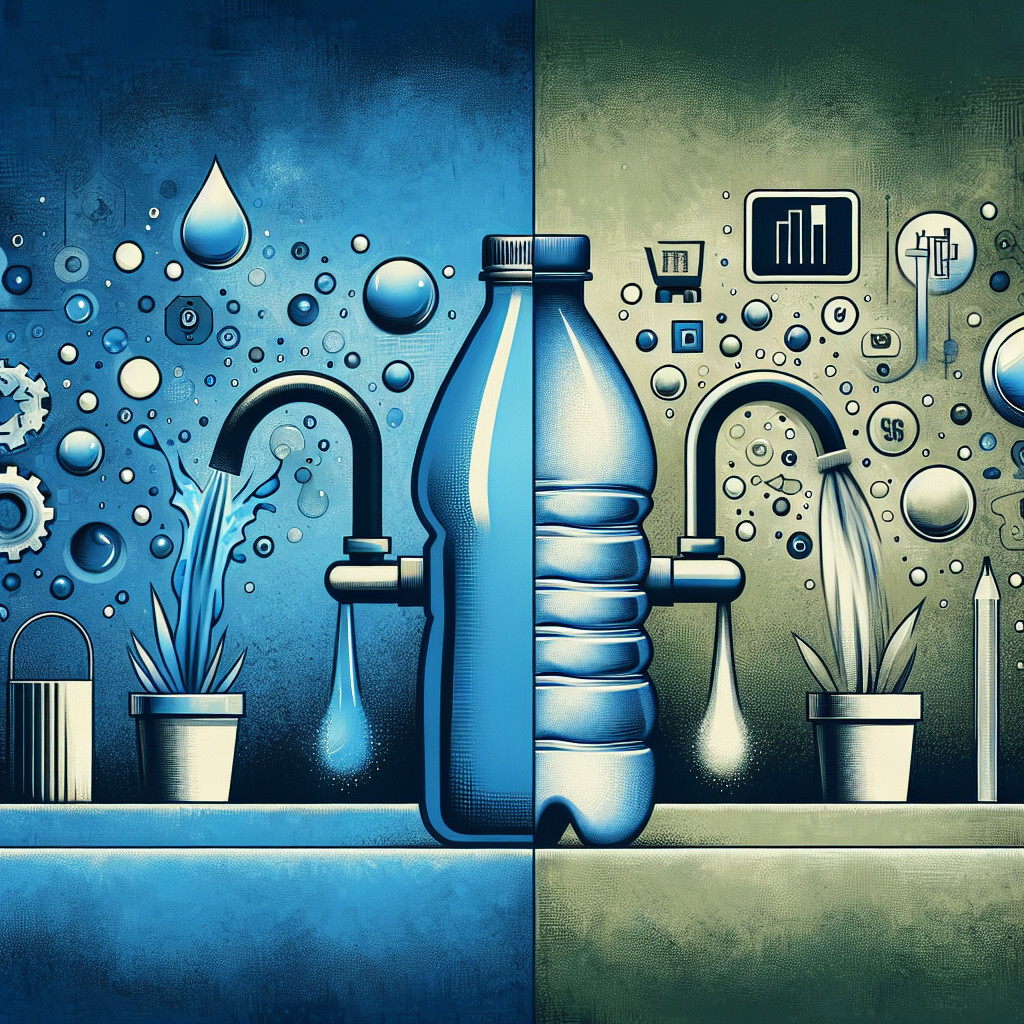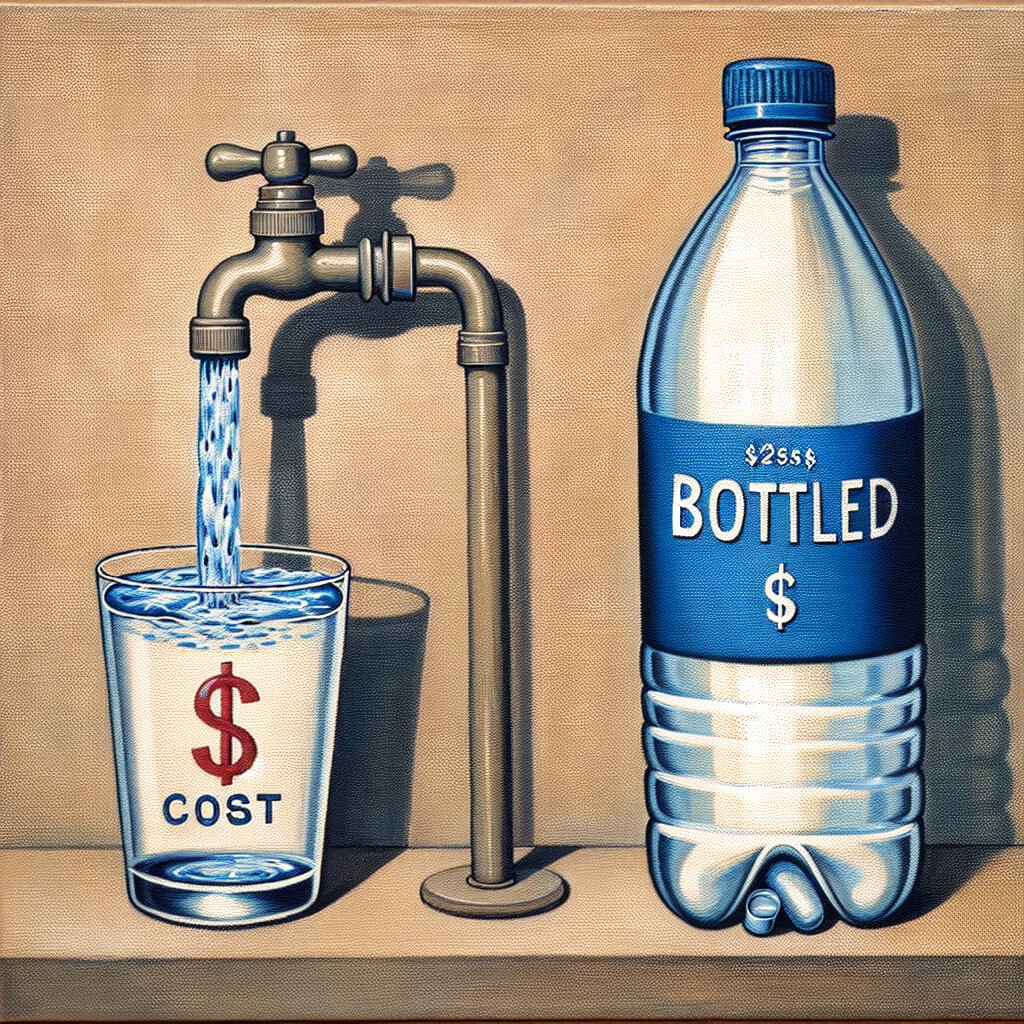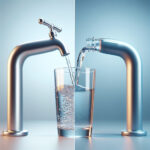-
Table of Contents
“Tap Water: Quenching Thirst, Saving Wallets.”
Introduction

Tap water is significantly cheaper than bottled water. While bottled water is often marketed as the cleaner, more convenient option, it is also far more expensive. The cost of bottled water includes not only the water itself but also the costs of packaging, shipping, and marketing. On the other hand, tap water is delivered directly to homes through a network of pipes and is paid through taxes or a relatively small utility bill. This makes the cost per gallon of tap water a fraction of the cost of bottled water.
Comparing the Costs: Tap Water vs Bottled Water
The debate between tap water and bottled water is a topic that has been discussed extensively in recent years. While the focus is often on the environmental impact, the cost comparison between the two is also a significant factor to consider. In this article, we will delve into the financial aspect of this debate, comparing the costs of tap water and bottled water.
To begin with, it is important to understand that the cost of water, whether it is tap or bottled, can vary greatly depending on the location. However, in general, tap water is significantly cheaper than bottled water. According to the American Water Works Association, tap water costs less than a penny per gallon on average in the United States. In contrast, the average cost of bottled water is approximately $1.22 per gallon, making it over 300 times more expensive than tap water.
The cost of bottled water is higher due to several factors. Firstly, the production process of bottled water involves several stages, including extraction, purification, bottling, and distribution. Each of these stages incurs costs, which are then passed on to the consumer. Additionally, the price of bottled water also includes a profit margin for the companies that produce and sell it.
On the other hand, tap water is supplied by local utilities and is funded by taxpayers. The cost of treating and distributing tap water is spread across many households, which helps to keep the price low. Furthermore, tap water is subject to stringent regulations and testing to ensure its safety, which is covered by the cost paid by consumers.
However, it’s worth noting that while tap water is cheaper on a per-gallon basis, there may be additional costs associated with its use. For instance, some people may choose to install water filters in their homes to improve the taste or remove potential contaminants from their tap water. The cost of these filters, and their maintenance, should be factored into the overall cost of tap water.
Despite these potential additional costs, tap water still generally remains the more economical choice when compared to bottled water. The Natural Resources Defense Council estimates that bottled water can cost between 240 to 10,000 times more than tap water. This stark difference in cost is even more pronounced when considering the environmental costs associated with bottled water, such as the energy used in production and the pollution caused by plastic waste.
In conclusion, while the cost of water can vary depending on the location and individual usage, tap water is generally much cheaper than bottled water. The production and distribution costs associated with bottled water make it a more expensive option, even before considering the environmental impact. Therefore, for those looking to save money and reduce their environmental footprint, choosing tap water over bottled water is a wise decision. However, it is also important to ensure that the tap water in your area is safe to drink, and if necessary, consider the use of home water filters as an additional cost.
The Economic Impact of Choosing Tap Water Over Bottled Water
The economic impact of choosing tap water over bottled water is a topic that has been gaining increasing attention in recent years. As consumers become more conscious of their spending habits and environmental footprint, the question of whether tap water is cheaper than bottled water has become a pertinent one. The answer, in short, is a resounding yes. However, the economic implications of this choice extend far beyond the simple cost comparison between the two.
To begin with, the cost of bottled water is significantly higher than that of tap water. According to the Natural Resources Defense Council, bottled water can cost between 240 to 10,000 times more than tap water. This is largely due to the fact that the price of bottled water includes not only the cost of the water itself but also the cost of packaging, marketing, and distribution. On the other hand, tap water is typically paid for through municipal taxes and utility bills, making it a much more cost-effective option for daily hydration.
Moreover, the economic impact of choosing tap water over bottled water extends to the broader economy as well. The production of bottled water requires a substantial amount of resources, including petroleum to make plastic bottles and energy to manufacture and transport them. This not only contributes to environmental degradation but also represents a significant economic cost. In contrast, the infrastructure for delivering tap water is already in place and requires far fewer resources to maintain and operate.
Furthermore, the consumption of bottled water can have negative economic consequences at the individual level. Regularly purchasing bottled water can add up to a significant expense over time. For instance, if a person were to consume the recommended eight glasses of water per day from bottled water, this could cost them hundreds or even thousands of dollars per year. Conversely, the same amount of tap water would cost only a fraction of this amount.
In addition to these direct economic impacts, there are also indirect costs associated with the consumption of bottled water. These include the costs of managing plastic waste, which can be substantial. According to the Container Recycling Institute, more than 60 million plastic water bottles are thrown away each day in the United States alone. The cost of collecting, transporting, and disposing of this waste is borne by municipalities and ultimately, by taxpayers.
Lastly, it’s worth noting that while tap water is generally safe to drink in many parts of the world, there are places where the quality of tap water is a concern. In such cases, bottled water may be a necessary expense. However, for those who have access to safe and clean tap water, choosing it over bottled water can result in significant economic savings.
In conclusion, while the choice between tap water and bottled water may seem trivial, it has far-reaching economic implications. Not only is tap water significantly cheaper than bottled water, but choosing it also contributes to a more sustainable economy by reducing resource consumption and waste. Therefore, for those who have access to safe tap water, it represents a choice that is not only economically wise but also environmentally responsible.
Why Tap Water is a More Cost-Effective Choice than Bottled Water
The question of whether tap water is cheaper than bottled water is one that has been asked by many, and the answer is a resounding yes. Tap water is indeed a more cost-effective choice than bottled water, and this is due to a variety of reasons.
Firstly, the cost of tap water is significantly lower than that of bottled water. According to the American Water Works Association, tap water costs less than a penny per gallon, while the average cost of bottled water is approximately $1.22 per gallon. This means that bottled water is about 300 times more expensive than tap water. This price difference is staggering, especially when you consider the fact that the quality of tap water is often comparable to, if not better than, that of bottled water.
Secondly, the environmental cost of bottled water is much higher than that of tap water. The production of bottled water requires a significant amount of energy and resources, including petroleum to make the plastic bottles, and additional energy to fill and transport them. Furthermore, only about 20% of plastic water bottles are recycled, with the rest ending up in landfills or the ocean, contributing to pollution and environmental degradation. On the other hand, tap water has a much lower environmental footprint, as it is delivered through an efficient infrastructure and does not require single-use plastic bottles.
Thirdly, the convenience and perceived safety of bottled water often come with hidden costs. While it’s true that bottled water is convenient and can be a lifesaver in emergency situations, it’s also true that the safety and quality of bottled water are not necessarily superior to tap water. In fact, tap water in many developed countries is subject to more stringent regulations and testing than bottled water. Therefore, the premium price of bottled water does not necessarily guarantee better quality or safety.
Moreover, investing in a water filter for your tap water can further enhance its quality and taste, making it an even more cost-effective choice. A good water filter can remove potential contaminants and improve the taste of tap water, all while costing significantly less than buying bottled water in the long run.
In conclusion, tap water is a more cost-effective choice than bottled water for several reasons. It is cheaper, has a lower environmental impact, and its quality and safety are often comparable to, if not better than, bottled water. While bottled water may be convenient and necessary in certain situations, for everyday use, tap water is a smart and economical choice. By choosing tap water over bottled water, you can save money, reduce your environmental footprint, and enjoy water that is just as safe and refreshing.
Unveiling the Hidden Costs: Bottled Water vs Tap Water
The debate between bottled water and tap water is a topic that has been discussed extensively in recent years. While many people believe that bottled water is a healthier and more convenient option, others argue that tap water is just as safe and significantly cheaper. However, the true cost of these two types of water is not always immediately apparent. When we delve deeper into the hidden costs associated with both, we find that the comparison is not as straightforward as it may initially seem.
At first glance, it’s easy to see why many people believe that tap water is the cheaper option. After all, it comes directly from our faucets at home, and we pay a relatively small amount for it through our utility bills. On the other hand, bottled water must be purchased individually, and the cost can quickly add up, especially for those who consume it regularly.
However, the financial cost of bottled water is not the only factor to consider. There are also environmental costs associated with its production and disposal. The process of bottling water involves extracting water, often from public sources, and then packaging it in plastic bottles. These bottles are then transported, often over long distances, to reach consumers. This entire process consumes a significant amount of energy and contributes to greenhouse gas emissions.
Moreover, the disposal of plastic bottles presents another environmental challenge. Despite recycling efforts, a large number of these bottles end up in landfills or in the ocean, where they can take hundreds of years to decompose. This not only contributes to pollution but also poses a threat to wildlife.
On the other hand, tap water is delivered through an infrastructure that is already in place, making it a more energy-efficient option. Furthermore, drinking tap water does not generate the same amount of waste as consuming bottled water does.
However, it’s important to note that the quality and safety of tap water can vary greatly depending on the location. In some areas, tap water may contain contaminants that can pose health risks. Therefore, some people may choose to invest in water filters or treatment systems to ensure the safety of their tap water. This is an additional cost that should be considered when comparing the cost of tap water to bottled water.
In conclusion, while tap water may seem cheaper at first glance, the true cost of water goes beyond the price tag. The environmental impact of bottled water, as well as the potential need for water treatment systems for tap water, are important factors to consider. Therefore, the decision between bottled water and tap water should not be based solely on cost, but also on a broader understanding of the impacts of our choices.
Ultimately, the choice between bottled water and tap water is a personal one, influenced by a variety of factors including cost, convenience, taste, and concern for the environment. However, by being aware of the hidden costs associated with both options, we can make more informed decisions about our water consumption.
Q&A
1. Question: Is tap water generally cheaper than bottled water?
Answer: Yes, tap water is generally much cheaper than bottled water.
2. Question: Why is tap water cheaper than bottled water?
Answer: Tap water is cheaper because it’s delivered through a government-funded infrastructure, while bottled water is a packaged product that involves costs like packaging, marketing, and distribution.
3. Question: Can the cost of tap water ever exceed the cost of bottled water?
Answer: In most cases, no. However, in certain situations where extensive water purification systems are needed for tap water, the cost could potentially exceed that of bottled water.
4. Question: Is it more cost-effective to drink tap water or bottled water?
Answer: It is generally more cost-effective to drink tap water due to its significantly lower cost compared to bottled water.
Conclusion
In conclusion, tap water is significantly cheaper than bottled water.






